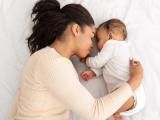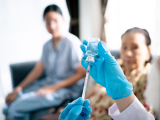Aug 24, 2009 (CIDRAP News) – An advisory committee today called on the Department of Health and Human Services (HHS) to be ready to respond quickly to safety concerns that may emerge during this fall's novel H1N1 influenza vaccination campaign.
The National Vaccine Advisory Committee (NVAC) unanimously passed a recommendation that HHS "develop, and where possible test in advance, a strong and organized response to scientific and pubic concerns about vaccine safety that may emerge during the 2009 H1N1 vaccination campaign."
"The challenge will be to communicate effectively and to differentiate rapidly between adverse events that may be causally related to the vaccine and those which would be expected by chance alone," states the recommendation.
The 17-member committee said HHS could prepare in two specific ways:
- Assembling information on background rates in the general population of anticipated adverse events following immunization. An HHS official at the meeting said such events might include, for example, heart attacks and shortness of breath.
- Organizing drills or practice scenarios for how the government will respond to concerns about adverse events temporally—but not necessarily causally—related to H1N1, including identifying data resources and strategies for communications messages
The recommendations are specifically intended for Assistant Secretary for Health Dr. Howard Koh, to whom the committee reports.
The recommendation comes as clinical trials of H1N1 vaccines are just getting under way. HHS expects to launch the vaccination campaign in mid October, when only preliminary trial results will be available.
Planners are mindful of the 1976 swine flu vaccination campaign, which reached more than 40 million people but was associated with an increase in cases of Guillian-Barre syndrome, a temporary paralytic condition. Officials say vaccine safety and purifications steps are much more advanced today than at that time.
The NVAC also approved a separate recommendation today that HHS develop a detailed overall plan for communicating about the H1N1 vaccination program. The group urged HHS to develop a comprehensive plan for achieving at least the following aims:
- Delineating the difference between seasonal flu and pandemic H1N1 flu
- Reaching out to healthcare providers who do not usually supply vaccination services, such as obstetricians/gynecologists and internists
- Identifying high-risk groups and groups that are targeted for both seasonal flu and pandemic flu immunization, and explaining why these groups may differ
- Discussing and responding to emerging news and events, such as vaccine supply and vaccine safety concerns
The two recommendations were passed the same day the President's Council of Advisers on Science and Technology called on the Obama administration to speed the development of strategies to communicate public health messages to help reduce the impact of the pandemic, among other steps. (See related CIDRAP News story.)
At today's NVAC meeting, Jenny Backus, HHS assistant secretary for public affairs, outlined steps the agency is currently taking to communicate with the public about preparing for both seasonal flu and the novel H1N1 virus.
Backus said HHS pushed hygiene steps such as hand-washing and cough etiquette during the spring and renewed that emphasis starting in July. From now into mid September the agency will be spreading the word about the importance of getting a seasonal flu shot. The third phase will be to urge target groups to get their H1N1 immunization.
"That would begin probably a week or two before we get the big bulk of vaccine out the door," she said. "I'm projecting starting it about the end of September. We need a little education period; we can't just drop vaccine into the states and expect people to get the shot."
Noting that the target groups for seasonal and H1N1 immunizations don't entirely match up, she said, "We definitely have our work cut out for us."
Among other things, HHS has lined up 44 Congress members of both parties to tape public service announcements about flu immunization, Backus reported. They will be posted on the HHS's flu.gov Web site and used in the lawmakers' districts.
See also:
Aug 24 NVAC meeting agenda
http://www.hhs.gov/nvpo/nvac/meetings/pastmeetings/2009/agenda20090824.html
NVAC home page
http://www.hhs.gov/nvpo/nvac/index.html

















